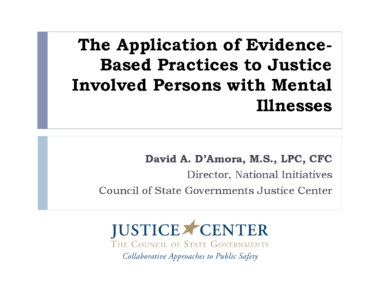The Right Interventions: What Works to Reduce Recidivism for Individuals with Mental Illnesses
This presentation was delivered at the 2013 JMHCP National Training and Technical Assistance Event. Practitioners face a number of challenges to reducing the prevalence of mental illnesses in criminal justice settings. Fortunately, there is a growing body of research that identifies practices associated with both positive public health and public safety outcomes. This plenary presented an overview of evidence-based practices and described the application of these practices to justice-involved individuals with mental illnesses.
About Presenter

A positive school experience, where a child feels secure, is essential for their well-being. However, for many children…
Read MoreWhen returning to their communities from criminal justice settings, people with behavioral health needs face barriers in accessing…
Read More Supporting Children of Incarcerated Parents: Reimagining School and Community Collaboration
Supporting Children of Incarcerated Parents: Reimagining School and Community Collaboration
A positive school experience, where a child feels secure, is essential for their well-being. However, for many children with incarcerated parents—one in 14 in the U.S.—school can feel far from safe due to stigma, trauma, and a lack of understanding.
Read More Assigned to the Cloud Crew: The National Incarceration Association’s Hybrid Case Management for People with Behavioral Health Needs
Assigned to the Cloud Crew: The National Incarceration Association’s Hybrid Case Management for People with Behavioral Health Needs
When returning to their communities from criminal justice settings, people with behavioral health needs face barriers in accessing basic needs—including food, housing, employment, transportation, education, clothing, and substance use and mental health services—which increases their risk of experiencing a crisis.
Read More Meet the Medicaid and Corrections Policy Academy Mentor States
Meet the Medicaid and Corrections Policy Academy Mentor States
New Hampshire Department of Corrections Commissioner Helen Hanks presents at the Medicaid and Corrections Policy Academy in-person meeting.
Read More Taking the HEAT Out of Campus Crises: A Proactive Approach to College Safety
Taking the HEAT Out of Campus Crises: A Proactive Approach to College Safety
The sharp rise in school shootings over the past 25 years has led school officials across the U.S. to take a closer look at ways to keep students safe. For Chaffey College in Rancho Cucamonga, California, a tragic incident at a nearby university hit close to home and spurred campus leaders to revisit their own school’s threat assessments and crisis responses.
Read More New Smart Supervision Resident Analyst Program to Increase Supervision Agencies’ Data Analysis Capacity
New Smart Supervision Resident Analyst Program to Increase Supervision Agencies’ Data Analysis Capacity
Ideally, leaders would have actionable data readily available to them when they need it most. However, many agencies encounter significant challenges related to procuring accurate, consistent, and timely data, often grappling with outdated systems and inadequate tools.
Read More











